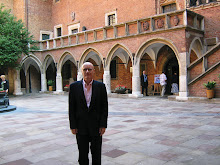NOT ALL POETRY IS MAD POETRY
With all the excitement in the poetry business about bipolar, chronically depressed and schizophrenic poets, I’d like to advocate here, briefly, for the non-psychotic, non b-p, non-chronically depressed poet. I admit I sometimes wish I had that rush of energy and imagination that is often documented in poets going all the way back before psychotropic drugs were even thought of as a temporary solace from that “mad” energy. Every year I read about more and more of the world’s gifted poets as having some sort of psychiatric diagnosis. I’ve lived close to these illnesses, I’ve assisted in a funeral of a dear poet who lost herself to the impulse of the noose. I’ve read some of the best poetry criticism that focuses on the mental health of wonderful, wonderful poets. I’ve read just about everything I can by Dr. Kay Redfield Jamison who has helped me more than any other clinical psychiatrist to understand what moves and terrorizes the fragile psyche of so many poets.
But every once in a while, admitting that I am a poet, and not diagnosed as a “mad poet,” I yearn for the calm, reasoned, compassionate, clever, charming, witty, imaginative voice of a sane poet. There are a few out there, aren’t there? I’ve learned that this propensity for writing poets gets more artists to the grave sooner than all other writers, and to be quite honest, I am quite saddened by this. At the same time, I know we must have a few elder, middle aged, somewhat aged, youthful and young poets who go through their daily lives without a manic or depressive impulse, just the quiet voice that calls the poet to the writing table, or keyboard, or whatever paper might be available for a dream in language, as some do call it.
Okay, I’ll admit I’ve been mad, sad, elated, ecstatic, joyous, amused, puzzled, perplexed, and all together overwhelmed with the beauty of experience tapped out into the beauty of lines and stanzas. I’ve written poems where I have been crying my heart out as I try to hear the voice of an ancient Incan warlord face the onslaught of Spanish conquistadors. I’ve laughed my way through a few lines, I’ve squinted, I’ve been baffled by the way lines simply appear on the page, and everytime it happens, I know I’m in a special time space warp that is for me the most precious of moments while here on Earth. Yet in all of those experiences, I can’t say they have come from a particular mental diagnosis. It just comes from the beauty of reading and writing, or writing and rewriting poems in the hopes that someone else might appreciate or just enjoy the meager work that I find to be the most fulfilling work of a lifetime.
I do enjoy the confessionalist poets and all who follow in their tradition. I am deeply appreciative for all the poets who have written through their depression and manic episodes, but occasionally, I just want to acknowledge that a poet doesn’t have to be a deeply troubled soul to be able to write deeply troubling poems. I do acknowledge that poetry is written in a particularly unique state of mind. Some might call it a dream state, a heightened state, an extra-sensory state, but just as a small footnote to the volumes and volumes of poets who have written with deeply troubled psychoses, I just wanted to add that a few of us out there, and throughout history, have just simply been awed by either the world, the language in the world, or maybe both. As a brief example, here’s something written just a few weeks ago that might illustrate where I’m going, or coming with this brief blog:
AT THE END OF THE WAR
(after “The End and the Beginning,” Wislawa Syzmborska, 1993)
DeWitt Clinton
We need to do something about all the lost limbs.
Would anybody please volunteer to search
For who has lost legs, arms, faces?
We’re all thirsty, yes, but does anybody know
Where we can find a brook, a creek that
Doesn’t have our floating cousins?
Yes, yes, we need a morgue, but first
We must find a few dogs to tell us
Who is beneath the stones.
We know Gertrude and Maurice and maybe
Alfonse, maybe more, all have to be found.
Bandages, surely someone has some bandages.
We want to rebuild. Does anyone have a ladder?
Let’s leave God out of this for awhile.
Let’s start in the square, and slowly remove
What was thrown down from the sky.
Who knows how to get a weather report?
Will there be good weather for tomorrow?
Yes, that’s a good idea, but we can always
Talk, there’s always a lot of time for talk.
We’ve got such a mess.
Brooms. Everybody, find all the brooms.
Can anyone send a letter, we need to let
Someone know this has happened.
Tomorrow we can start burning our families.
Surely someone will see the smoke.
Surely someone will come.
Tuesday, January 2, 2007
Subscribe to:
Post Comments (Atom)


1 comment:
Hi De! I'm trying again. The first blog entry didn't have a "comments" item at the end, which is why I tried the email connection. But this entry has a different display at the bottom which includes "comments." I like your poem "At the End of War." How can we cope with the terrible destructiveness of war? It is up to the poets to convey somehow that this terrible damage (to the soul too, not just the buildings and bodies) is not entirely a defeat. Keep up the good work. Jerre
Post a Comment